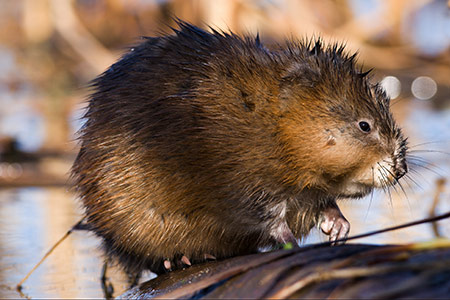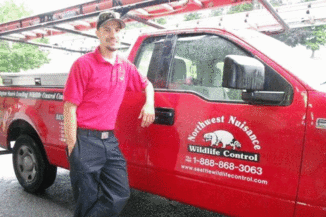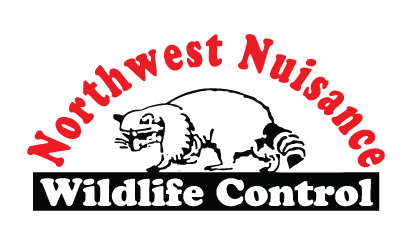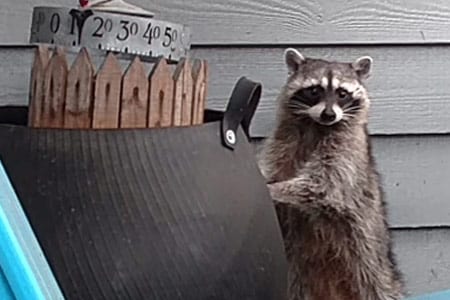Welcome to NW Nuisance Wildlife Control – your one-stop destination for all your muskrat removal needs. Despite their unassuming and harmless appearance, muskrats can wreak havoc on your property. Their penchant for digging burrows along levees, embankments, and pond linings can lead to severe structural issues, often resulting in costly repairs. Moreover, unchecked muskrat activity can potentially trigger the collapse of dams and ditches, leading to significant flooding and water damage. At NW Nuisance And Wildlife, our team of skilled and seasoned professionals is fully prepared to tackle these challenges. Equipped with industry-leading tools and backed with years of experience, we are committed to efficiently and humanely removing these critters from your property. Our services restore safety to your surroundings and offer you the peace of mind that comes with a critter-free environment.

Muskrats, also known as `Ondatra zibethicus`, are small to medium-sized aquatic rodents native to North America but also found in parts of Europe, Asia, and South America. Adapted for a semi-aquatic lifestyle, they inhabit wetlands and areas near ponds, rivers, and lakes, using their specialized bodies, flattened tails, and webbed hind feet to move efficiently in water. Their diet mainly comprises aquatic plants, but they also eat small aquatic creatures, such as snails, frogs, and mussels, when vegetation is scarce.
However, muskrats can cause significant damage by burrowing into human-made structures like dikes, dams, and water retention embankments, leading to potential instability and collapse. Additionally, they can be a nuisance to farmers when they raid nearby agricultural crops. Despite these issues, muskrats contribute positively to wetland ecosystems by participating in nutrient cycling and providing habitats for other species via their burrows. Therefore, effective management of muskrat populations is crucial for maintaining the health of these ecosystems.
Q: What are the signs that I have a muskrat problem?
A: Some telltale signs may indicate a potential muskrat problem in your vicinity. You might notice vegetation in and around the water bodies being heavily consumed or cleared out. Look for burrows in the banks of water bodies with a hole 4 to 6 inches in diameter, typically below the water’s surface. Muskrats also leave behind their droppings near feeding areas or on floating platforms they build as feeding stations. These droppings are about 1/2 inch in length and tapered at the ends. Due to their burrowing activity, you may also see damage to human-made structures such as dikes, dams, and embankments. And lastly, if you spot a small, brown creature with a flattened tail swimming in a pond or river, it could very well be a muskrat.
Q: What damage do muskrats cause?
A: Muskrats can cause considerable damage, especially to human-made structures such as dikes, dams, and water retention embankments. They burrow into these structures for habitation, leading to potential instability, leakage, and even collapse. This burrowing activity can be extremely problematic, as it may cause flooding and property damage. Muskrats can also be a significant nuisance for farmers. They may venture out of their habitats to adjacent agricultural fields and feed on crops, leading to considerable yield loss. Furthermore, muskrats can negatively affect the stability of banks or shorelines due to their extensive burrowing activities, leading to erosion and potential changes in the ecosystem.
Q: Are muskrats dangerous?
A: While muskrats are not typically dangerous to humans or pets under normal circumstances, they can pose certain risks. Muskrats are known to defend their territory when threatened, and their sharp teeth can inflict painful wounds if they bite. Additionally, like many wild rodents, muskrats can carry diseases such as tularemia, leptospirosis, and giardiasis, which can be transmitted to humans or pets through their urine or feces. However, the likelihood of such transmission is relatively low unless direct contact occurs. It’s important to remember that wild muskrats should be treated with caution and respect, and any problems with muskrats should be handled by trained wildlife management professionals.
Q: How do I prevent muskrats from coming back?
A: Preventing muskrats from returning to your property involves a few key strategies. First, limit their access to food by controlling aquatic vegetation around your water bodies and managing your landscape effectively. Consider installing rip-rap, a layer of large stones or concrete along the banks of water bodies, which can deter muskrats from burrowing. Water level management can also help; muskrats are less likely to inhabit areas where water levels fluctuate significantly. Fencing can be an effective deterrent, especially around gardens and farm fields; ensure the fence extends a few feet underground to prevent the muskrats from burrowing beneath it. Ultimately, professional wildlife control services may be necessary to implement a comprehensive and effective muskrat prevention strategy.
Q: We have something trapped in our attic/stove vent/fireplace. Can you get it out?
A: More than likely, yes. We commonly remove birds, rats, squirrels, raccoons and other animals from attics, crawlspaces, stove vents, fireplaces and other locations in homes, garages and sheds.
Q: Do you remove dead animals from walls, attics, etc?
A: Yes. We can usually find and remove dead animals from inside structures. Please call for price quote.
Q: Can you pick up a dead animal from my yard or inside the house?
A: Yes. We offer dead animal removal and disposal services. Please call for price quote.
Q: Do you have anything to get rid of the smell from dead animals and skunks?
A: Yes. Please call us regarding the specifics of your odor removal needs.
Q: What is a “Wildlife Control Operator” or “WCO”?
A: A Wildlife Control Operator (or “WCO”) has a license from the Department of Fish and Wildlife that allows them trap, capture, and remove unclassified wildlife or small game from private property.
Q: What are your fees?
A: Service fees vary greatly depending on the task at hand. Please call us to receive a quote over the phone. If the situation requires us to visit the site before offering a quote, we will tell you this during the initial call
Q: Do you trap and remove moles?
A: No, Initiative 713 banned the use of mole traps and our code of ethics prevents us from partaking in illegal activities. Anyone currently trapping moles is breaking the law.
Q: What do you do with the animals that you catch?
A: All nuisance wildlife control operators in the state of Washington are required by law to euthanize the animals caught on private property. Nuisance wildlife cannot be transported and relocated/released.
Q: Do you offer consultation services?
A: Yes. Please call us and we will gladly discuss the situation at hand.
Q: Do you offer consultation services?
A: Yes. Please call us and we will gladly discuss the situation at hand.
Q: Are you licensed by the state?
A: Yes. We are licensed by the State of Washington and by the Washington Department of Fish and Wildlife. We are also bonded and insured.
Q: Do you also control ants, spiders, scorpions, bugs and termites?
A: Yes, please call the pest control division of our company, Willard’s Pest Control at (425) 820-1980.
Q: Do you control problem birds?
A: Yes, please call our “sister company”, Bird Busters
About Us

NNWC, established in 1985 is one of the oldest and most trusted wildlife removal companies serving the PNW. We specialize in live trapping, animal control, exclusion and clean up.
We are licensed by the Washington Department of Fish and Wildlife to manage a variety of wildlife conflicts that include: raccoons, squirrels, opossums, beavers, nutria, river otters, mountain beavers, bats, skunks, bobcats and coyotes. We specialize in live animal removal. NNWC serves both residential and commercial customers offering solutions tailored to meet your specific nuisance wildlife conflict needs.
Our trappers have Bachelor of Arts degrees from the University of Idaho in Wildlife Resources and University of Southern California in Environmental Science. Collectively we have over 50 year’s wildlife management experience. Whatever the wildlife conflict we have the experience, knowledge and skill to humanely and professionally solve your problem.
Call us at 425 820-7476 to talk about the muskrat removal process or you can email us at NNWC1985@willardspestcontrol.com
Don’t let a neglected crawlspace or attic cause problems for your home!
Our team provides expert crawlspace cleanouts, insulation removal, and odor control to keep your space safe, dry, and pest-free.



